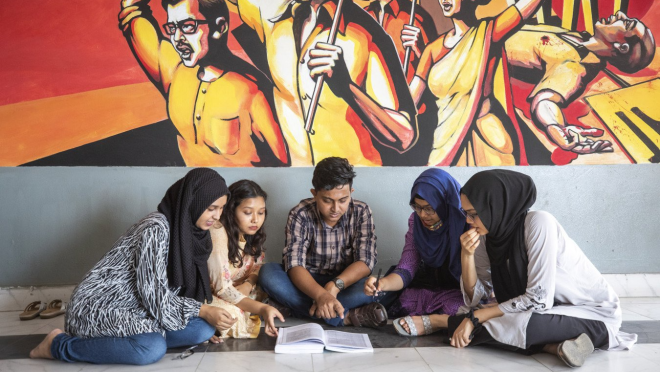Blended mode is a more effective method for learning. Here is why
Blended mode is a more effective method for learning. Here is why

Educational institutions can start with a blended mode where examinations and extra classes could be held physically while the usual classes continue online. This would save time and be cost-effective for all students
But now that the educational institutions have recommenced on-campus classes, A surprisingly posted that he prefers online classes over in-person.
Perhaps, over the last two years, he missed the environment, the hangouts, the group projects and everything else so much that he really was just looking forward to going back to campus.
Then, Dhaka city happened to A.
Some of the top rated universities in Dhaka are situated in outlying places, where a majority of the students have to travel far from home to reach their destinations.
Not every student lives near Bashundhara, Madani Avenue or Savar. But thanks to Dhaka’s unbearable traffic, students lose a number of hours sitting in the gridlock.
Moreover, congested buses, scorching heat, pollution and the time lost among all that ruckus – all add up to their suffering. Is it not a little too much?
I bet, if people from older generations are reading this right now, they will start with their story of crossing rivers and jungles simply to attend school. Jokes aside, we do have an option to let that not be our case.
Many years ago, people used to write letters and wait for weeks and months for them to reach the recipients, and receive a response in twice the time since the letters were issued.
But now that we have smartphones and we can send messages and emails instantly, we cannot regress to sending and receiving letters. That is because we are evolving.
From waking up to social media notifications to watching something on Netflix, our lifestyle is practically crammed with technology. After all, this is the era of digital Bangladesh.
Now, I am not suggesting we completely switch to online learning and forget that campuses exist. For school students especially, interaction is inextricable; interaction reinforces the learning environment as well as socialisation.
Moreover, younger school students – more like children – are mostly assisted by their parents to sit for online classes. Working parents and those who are not that tech-savvy, find it unfeasible at times to stay available for their children while classes are going on.
Also, in all honesty, the internet is not adequate even in central Dhaka, despite the undelivered promises of ‘lightning fast internet’ by telecom operators. And when it comes to rural areas, let us not go there.
Then again, if I dredge up the scenario of when university classes suddenly started being held online with the onslaught of a pandemic, students did find out ways to adjust.
Some complained they had to repeatedly buy internet packages and some complained their devices were not compatible with Canvas, Zoom etc. Nevertheless, they still attended the online semesters, for almost two whole years.
Of course, a good connection comes at a good cost; good cost meaning expensive. But at its very least, the pay-off is comparatively better to the situation we find ourselves in all too abruptly.
Also, a large number of students take the trouble of shifting to Dhaka to attend university. With that comes rent, utility bills and living costs; the list goes on and the expenses stack higher.
Once again, the older generations will say to this, “Is education supposed to be full of fun?” Not really, but that also does not mean it has to cost students a premium and drain their families, both physically and mentally.
Agreeably, we cannot switch to a completely online environment overnight. But what if we had a blended mode, starting with university students?
Examinations, group discussions and extra classes could be held physically, while the usual classes could be held online.
From the perspective of an employer, I would be impressed if I see a graduate who has the experience of adapting to both an offline and online environment.
I would be amazed to learn that s/he is up-to-date with the tools and applications required to attend online classes and submit assignments while also adapting to a physical environment.
Addressing the elephant in the room, is this going to help beat Dhaka traffic conundrum just like that? No. But without a doubt, it will be beneficial to university students.
Assessing their success or failure, we would also know whether or not we can pilot a better plan for school and college students.
Disclaimer: This article first appeared on TBS on 14 April 2022, and can be found at Blended mode is a more effective method for learning. Here is why


